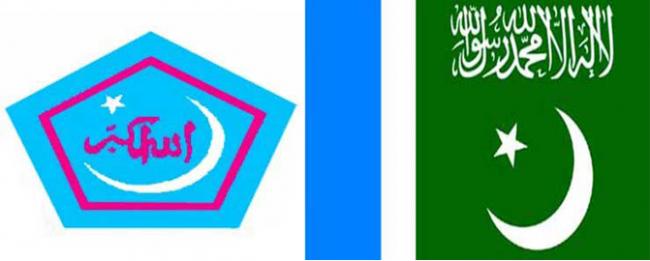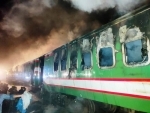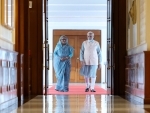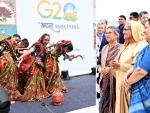Column

Genocide, Shahbag movement and ‘Joy Bangla’
‘Genocide’ is the term generally used in the context of large scale killings during the liberation war in 1971. The exact number of people killed by the Pakistani occupying forces and their local collaborators during the Bangladesh liberation war is not known. It could be much more than what has been estimated so far. Most estimates put the figure at around three million and more than eight to ten million had fled to India for safety. An estimated 200,000 Bengali women were raped by the Pakistani forces and their local collaborators, who also committed many other heinous crimes during the war against Pakistan.
On March 25, 1971 the University of Dhaka was attacked by the marauding forces. Death squads roamed the streets of Dhaka, killing some 7,000 people in a single night. Within a week, half the population of Dhaka had fled, and at least 30,000 people had been killed. Narrating the atrocities in Dhaka University, US Consulate in Dhaka on March 31, 1971 reported that naked female bodies in Rokeya Hall of Dhaka University were found “hanging from ceiling fans with bits of rope,” after apparently being “raped, shot, and hung by heels” from the fans. ‘Genocide’ is the term used to describe these horrific brutalities and large scale killings during nine months of liberation war in 1971.
Khaleda Zia, as a former Prime Minister, should have known better than to misinterpret the recent deaths during clashes with security forces as genocide. Since its founding in 1979, BNP has never found it necessary to draw attention to the genocide which left three million people dead in 1971. After the recent violence let loose by the JEI/ ICS workers in Dhaka and other places, Khaleda Zia chose to remain silent even on the issue of burning of national flag and desecration of Shaheed Minar by the JEI/ICS cadres. After 42 years of independence, JEI/ICS leaders not only did not apologize for their murderous role in 1971, they seem to feel strong enough to burn the National Flag and desecrate Shaheed Minars across the country in furtherance of their mission to turn Bangladesh into a confederate of Pakistan. Khaleda Zia’s silence on these issues is inciting JEI/ICS activists to carry out terrorist activities across the country unabated.
The Shahbag movement that began on February 5, 2013, has now spread to other parts of the country. Hundreds of thousands of young men and women are refusing to leave until all those convicted of war crimes are sentenced to death and a ban imposed on JEI for the war crimes committed in 1971.
Scared by the spread and the wide sweep of the secularist nature of the Shahbag movement Khaleda Zia finds no alternative but to oppose it, as submission to the upsurge of the youth at Shahbag would mean the end of road for Islamist politics in Bangladesh. The leaders of Shahbag movement are quoting Sheikh Mujibur Rahman to say “first I am a Bengali, then a Muslim, Hindu or Buddhist” and this negates the concept of Two Nation theory propounded by Pakistan and leaves no space for Islamist politics. This movement, if it succeeds, would resolve the identity of Bangladesh – whether its majority people are first Bengali, then Muslim or vice versa. Moreover the slogan ‘Joy Bangla’ that reverberates the area vindicates secular nature of the movement. It is quite obvious that in such environment Khaleda Zia’s maneuvering space would be restricted.
Khaleda Zia, through a deliberate negation of history, questioned the ‘Joy Bangla’ slogan saying it lost general acceptability in post-Liberation times owing to what she calls the ‘partisan nature of the government that came to power after 1971’. This slogan carried the freedom loving people of the country through the War of Liberation. In the nine months of the war, the freedom fighters went into battle raising full-throated ‘Joy Bangla’ slogan which became a symbol of Bengali nationalism.
This slogan was first undermined after the assassination of the country’s founder father Sheikh Mujibur Rahman. Khondokar Moshtaque who took over power in August 1975 discarded ‘Joy Bangla’ and used the Pakistan-style slogan “Bangladesh Zindabad”. This idea was subsequently picked up by the nation’s first military ruler and BNP founder General Ziaur Rahman, who also made sure, as martial law administrator, that the secular spirit of the constitution was removed and replaced by invocations of a communal nature. General Ershad and then Khaleda Zia and their political friends upheld “zindabad” despite the fact that it was ‘Joy Bangla’ which continued to exercise a hold on the public imagination.
Efforts are being made by insidious elements across the country to paint the legitimate, patriotic protests at Shahbagh Square as a coming together of atheists. Khaleda Zia branded these young men and women ‘atheists and spoilt’ since they are demanding capital punishment for all war criminals and ban on JEI. One of the organizers of the blogger-led Shahbag movement Ahmad Haider Razib, who was brutally killed by the Islamists for leading anti-war crimes movement, is being demonized every day by the JEI and the BNP ever since his death. Images of young men and women, collected fromhotels, night clubs, red light areas and other sinister corners, are being super-imposed on the pictures of the Shahbagh rally to suggest that immorality is what drives these young men and women who, in a bold demonstration of loyalty to the founding principles of Bangladesh, have only asked that the war criminals of 1971 pay for their misdeeds.
BNP/JEI Alliance is scared that the ideals of the Shahbag movement – Bengali nationalism, Secularism and Democracy – have placed the ruling Awami League in an advantageous position ahead of the upcoming parliamentary elections. To rule out this possibility Khaleda Zia and her ally JEI have created an extremely volatile situation and plunged the country into a prolonged turmoil through continued street violence and shut- downs enforced across the country and through other organized incidents of violence.
BNP and its ally JEI have also started a campaign in the media that the bloggers who form the backbone of Shahbag movement are atheists and hence the Mullahs call them ‘Murtad’ (apostates). As a result of this vile campaign, Prime Minister Sheikh
Hasina and other Awami League leaders have bacome worried that this factor may go against their bid for another term in power as the Awami League may be viewed as soft on the ‘Murtads’ and hence anti-Islam. In order to pronounce their pro-Islam credentials they have decided to get tough on the bloggers and arrested a number of them. The ruling party’s pro-Islam stance for electoral gains has come in for censure from the pro- liberation and secular forces. Prime Minister Sheikh Hasina must realize that in case elections are fought on Islamic plank, Awami League which is primarily known as the vanguard of secular politics would lag far behind BNP even if it adopts staunchest pro- Islam stance for electoral benefits. Hasina should realize that her persona as daughter of Bangabandhu Sheikh Mujibur Rahman and as the repository of liberation war values will continue to hold sway over the electorate for her party.
Khaleda Zia, in her attempts to regain power, sought to incite members of the armed forces. In a direct provocation to the members of the armed forces in Bogra recently she said that the Army could not ‘play the role of silent spectator’ when ‘people are getting killed’, adding that ‘it would play its role in due time’. She also called upon the people to overthrow the Awami League led government. Addressing a public meeting at Manikganj she said “some more lives would be lost in the process to push them (Awami League government) out”. Thus she has made no secret of her desire to come to power either with Army support or through blood shed.
In Bangladesh certain sections of armed forces, some mercenary elements and sections of pro-Pakistan political entities have often come together to subvert institutions of democracy and hijack State power for their selfish gain. These groups have always found religion as a convenient tool and hence they advocate a strong Islamic nationalist identity for the country and paint India in a negative light to generate a sense of psychological insecurity among the masses.
The only silver lining seems to be that within the armed forces only the unscrupulous elements have showed eagerness to join the mullahs and mercenaries to subvert democracy and grab State power. There are still important sections within the Army who do not wish to get involved in politics. The way senior Army officers remained supportive of the Sheikh Hasina led democratic government during the BDR mutiny in February 2009 despite provocations is a pointer to both a fair degree of professionalism within the military and even resilience of democratic institutions in the country.



